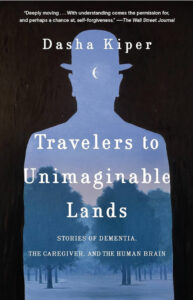
By Dasha Kiper
Reviewed by Victoria Starr Marshall
It’s a journey we hope we’ll never take—becoming a traveler in the land of dementia or the caregiver to a friend or loved one traveling that path. Each journey is unique—there are no maps or guides, and no caregiving friend or family member on this journey is unaffected.
In Travelers to Unimaginable Lands, Dasha Kiper writes, “Dementia disorders may bring chaos, devastation, and loss, but the mind is not without its defenses. It continues to weave a meaningful narrative, even from events that threaten to diminish essential parts of our loved ones and ourselves.” She masterfully describes the workings of a healthy brain and its need for continuity as it tries to reconcile the inconsistencies, behavior, and personality changes encountered when caring for someone with a diseased brain, and how this affects the caregiver.
Our emotions, our “intuitions,” can create what she calls the caregiver’s dilemma: “Caregivers may realize their parents or spouses suffer from dementia, but in many cases it does not inhibit them from reacting emotionally and erratically to their [loved ones’]misconduct or delusions.” That’s due in part to how a healthy brain works and because, “When we think of Alzheimer’s, we usually think of it as erasing the self. But what happens in most cases is that the self splinters into different selves; some we recognize, others we don’t. As with memory, the self is not an ‘all or nothing’ affair.”
We’ll often get glimpses of the person or personality we recognize, so it’s easy to believe the person we love is still in there and is acting intentionally, even though we know their brain is damaged. Because of this, caregivers will often berate themselves for not responding with more patience and understanding. Kiper seeks to help us understand how difficult it is to not respond with frustration, or argue, or fall into the same traps again and again when dealing with a diseased brain. She wants caregivers to forgive themselves.
I loved this book and count it as one of the best I’ve read on caregiving someone with a dementia disorder. I found her exploration of defining consciousness fascinating and revealing. “Consciousness may be the ultimate lottery prize of evolution,” Kiper writes, “allowing us to adapt and change as our environment changes, but it is also quite capable of deluding itself … Consciousness in human beings is accompanied by the intuition that we have volition and free will. And this intuition is continually reinforced by the story consciousness invents, the one in which consciousness is responsible for all our actions. It’s why people who are not in control continue to act as though they are”—even when they have dementia.
Travelers to Unimaginable Lands is a must-read for anyone caring for a loved one with a dementia disorder and anyone who knows a caregiver. I cannot recommend this book more highly.

